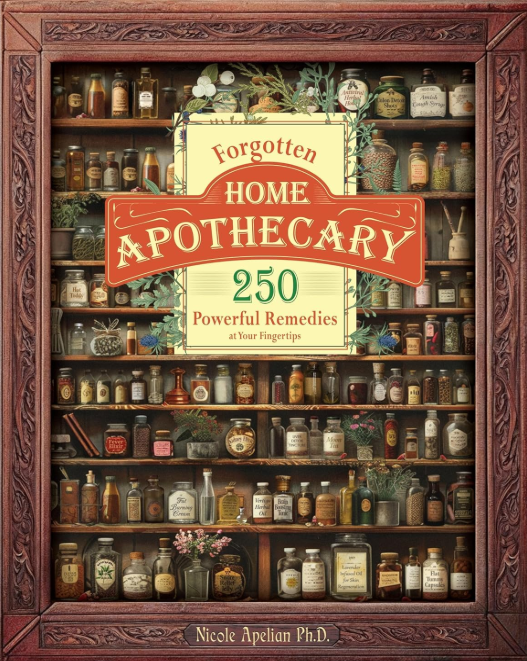This blog runs on affiliate links like some people run on caffeine and denial. If you click one and buy something, we might earn a small commission—at no extra cost to you. It doesn’t make us rich, but it does keep this corner of the internet alive and slightly less unhinged. We only recommend stuff we actually use and love. No shady nonsense. Promise.
These books are our constant companions when it comes to herbalism. We’ve flipped through them so many times, I’m honestly shocked they’re not completely worn out by now. They’re the kind of books that never seem to get shelved for long—they’re always close by when we need them.
Herbal Library
Forgotten Home Apothecary: 250 Powerful Remedies at Your Fingertips by Dr. Nicole Apelian
This one is hands-down one of our favorite herbalism books. The recipes are simple, practical, and easy to follow, making it perfect for beginners and seasoned herbalists alike. What we love most is how it’s organized—it’s broken down by body system with recipes for everyday ailments.
Inside, you’ll find sections for the cardiovascular system, digestion, detoxing, respiratory health, the nervous system, auditory and visual support, musculoskeletal health, immunity, skin care, endocrine balance, reproductive health, urinary health, and even personal care products.
Each section goes a step further, covering specific concerns and offering clear, step-by-step instructions for making your own remedies. Plus, it includes details on proper dosages, potential side effects, and possible drug interactions, so you can feel confident and informed while building your home apothecary.
Unlike some books that focus mainly on ailments and ready-made recipes, this one takes a deeper dive into the process of herbalism. You’ll learn the ins and outs of harvesting herbs and the step-by-step methods for making tinctures, decoctions, teas, salves, and more.
After that, it moves into detailed profiles of individual herbs—covering how to identify them, their edible and medicinal uses, important safety warnings, and even recipes to try. It’s both a guidebook and a hands-on reference you’ll reach for again and again.
The Lost Book of Herbal Remedies by Dr. Nicole Apelian
This book picks up right where The Lost Book of Herbal Remedies leaves off, diving into even more herbs that weren’t included in the original. It’s the perfect companion volume if you’re looking to expand your herbal knowledge and round out your collection.
The Lost Book of Herbal Remedies II by Dr. Nicole Apelian
This is where our herbal journey first began. The Chestnut School of Herbal Medicine is just about an hour from where we live so it felt like the perfect place to dive in—especially knowing that the plants growing in their backyard are the same ones we find in ours.
The book is a beautiful extension of that learning. It walks you through everything from planning and growing your own herbal garden to harvesting, healing with food, and making your own herbal preparations—complete with recipes to get you started.
The Healing Garden by Juliet Blankespoor
I reach for this book all the time—often alongside Nicole Apelian’s guides—and it never disappoints. It starts with the basics, walking you through common preparations like tinctures, teas, infusions, and extracts. From there, it dives into more than 150 herbs and superfoods, breaking each one down into an easy-to-follow format.
For every plant, you’ll find details on its uses, habitat and origin, supporting research, dosage guidelines, possible side effects, synergistic combinations, and so much more. It’s one of those books that’s both practical and thorough—the kind you’ll want to keep within arm’s reach.
Herbal Synergies: A Guide to Healing Common & Chronic Ailments by Lily Quinn
Adaptogens: Herbs for Strength, Stamina, and Stress Relief by David Winston, RH(AHG) with Steven Maimes
If you’re ready to go a little deeper into the world of healing herbs, this is a great next step. The book begins with the history of adaptogens, touching on their roots in Ayurveda and Chinese Medicine, and then explores how these powerful herbs work and why they’re so effective.
It’s definitely a bit more complex than beginner-friendly guides, and I found it much easier to understand after building a foundation of basic herbal knowledge. But once you’re ready, this book opens the door to the fascinating (and sometimes mind-blowing) world of adaptogens—herbs that are as amazing as they are complex.






